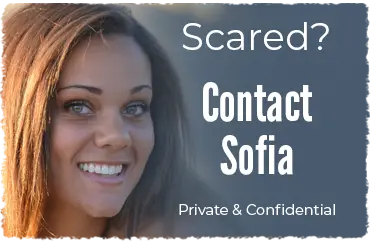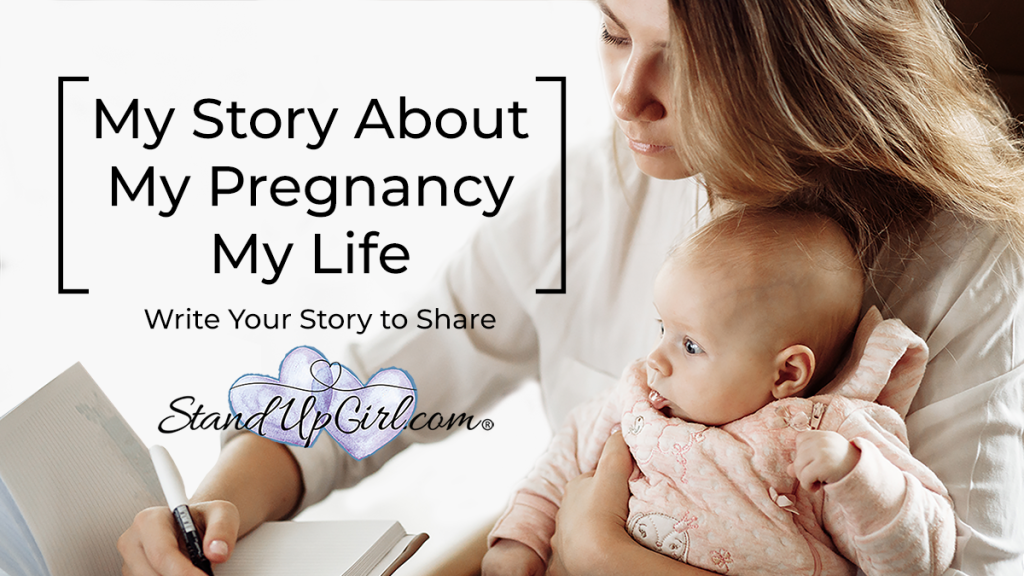
‘He killed my baby, he killed my baby!’: The day I lost my daughter to the Culture of Death
– by Jason Jones
It was two days before my seventeenth birthday, a Saturday morning, the day after a football game in which I’d played. So I was tired and sore, but I could smell breakfast coming from downstairs and somebody was walking up the stairs. I was half asleep. The door opened: it was my girlfriend, I smiled, of course—but from the look on her face I could see that this wasn’t called for. This was a serious moment. I steeled myself.
After a few long seconds, she looked up at me and said, “I’m pregnant.” That woke me up quick. We sat there in my bedroom, two young teenagers. My room was still a boy’s place, hung with football posters, sneakers, and baseball gloves strewn across the floor. But there I was, sitting next to my pregnant girlfriend. I knew all of a sudden I’d lost the right to keep on being just a boy. My girlfriend went to an all-girls Catholic school and looked ahead to college, while I was dreaming of college football and a career in the NFL. We each had a plan for our lives. It was time to scrap those plans.
We strategized together figuring out how to take care of the new life we created. It felt completely natural and, incomprehensibly, even a little exciting: Our adult lives were starting much sooner than we had planned, but we’d figure it out. So here’s what we decided: I could drop out of high school to join the army (a friend of mine had just done the same). My girlfriend would keep things secret, wear baggy sweaters and take vitamins until I got back from basic training and then we would be together—and I’d take care of all three of us.
So that’s what we did. I went to the recruiter’s office; I got the paperwork, which I needed my mother and my high school principal to sign. Now, out of five hundred and sixty-five students at Amos Alonzo Stagg High School, I was number five hundred and sixty-five. So my principal was quite happy to sign that piece of paper. My mother, with five kids, was also quick to sign the paper, with very few questions asked.
When I got to basic training, I didn’t go to church. I tried to once, but it was just too much for me to bear. In fact, I realized I’d rather do anything else. So I asked the drill sergeants, “When the rest of you guys go to church, can I stay back and clean something?” They agreed, so I took on pots and pans duty, which nobody wanted. I discovered that the station was right next to a freezer where the drill sergeants would hide ice cream bars. I realized that if I took those ice cream bars, packed them in buckets of ice, and snuck them upstairs, when the soldiers came back from church I could trade them. “You shine my shoes for a week? Okay, here’s an ice cream bar. You polish my brass for a week? Okay, here’s an ice cream bar. You make my bed….” And so skipping church turned out to mean that I didn’t have to polish my brass, shine my shoes, or make my bed. Not the best start for my moral education….
I was almost finished with basic and advanced infantry training and getting ready to graduate, and go home. I’ll never forget the day—it was a Sunday when I was cleaning pots and pans while everybody else was busy praying. A friend came running in and said, “Jones, your girlfriend’s on the phone and she’s crying.” So I ran out, knowing that I wasn’t supposed to leave my station or answer the phone. But I picked it up, and she was crying, as I have never heard a woman cry before. Ever. The only way that I can explain it is that her soul was crying. And she kept saying over and over and over again, “I’m sorry, I’m sorry, I’m sorry. It wasn’t me.” And then her father said, “Jason,” over the other line, “I know your secret, and your secret’s gone. She had an abortion.”
“Call the Police, My Girlfriend’s Father Killed My Child.”
As soon as he’d said that word, a sergeant reached over my shoulder and hung up the phone. So I punched him. Another drill sergeant grabbed me, but he saw that I was crying, just saying over and over again, “He killed my baby! He killed my baby!” They pulled me into my captain’s office and threw me in a chair. At the sight of me falling apart like this, my captain—a big army ranger—looked pretty broken up himself. I managed to form some sentences: “Sir, call the police, my girlfriend’s father killed my child.” And he asked me to explain what happened. And as I did he looked confused and he said, “Private. Why would I call the police? Don’t you know that abortion is legal?” And you know, I didn’t.
Although I was just an E1 private making three hundred dollars a month I did know one thing—that human life began at fertilization. That information was not above my pay grade. And I knew that my child was a human being. My captain must have been pro-life, maybe a Christian, because he soberly and sympathetically gave me a Sparks Notes version of Roe v. Wade. Then he handed me a roll of quarters for the phone and said, “I want you to go to the PX; I can’t have you disturbing the whole battalion.” I walked to the PX, hearing again the sound of my girlfriend sobbing, feeling our loss in my gut. The thought of that baby had kept me going, every grueling day of basic training. My heart was broken.
And my mind was reeling. What really knocked the wind out of me, what was really incomprehensible, was that what had happened to my baby was perfectly legal. That wouldn’t sink into my head. It was too insane. I got to the payphone, and I called her back. We stayed on until every quarter ran out and the mechanical voice said, “You have sixty seconds. Please deposit more change.”
But I didn’t know what to say, because she was still crying. And so I said the only thing I could think of that might comfort her. And I meant it. I said, “I promise you, that even if no one else cares about abortion, and if it takes me the rest of my life, I will end abortion for our daughter Jessica” (we knew that our child was a girl because the abortionist said to my girlfriend afterward, “By the way, your baby was a little girl”). And I know now that no one person can defeat the Culture of Death. But I really meant it at seventeen, that I would through my own will end abortion. And I believed it.
When I got back to my duty station—I was stationed at Schofield Barracks, Hawaii—I figured out how to get started. I said, “I’m gonna start knocking on doors” (I knew the Mormons and the Jehovah’s Witnesses would knock on my mother’s door, and she would talk to them). Just off Schofield Barracks there was all this housing, full of Filipino immigrant farm workers. I would knock on their doors and the workers would open the door, “Haole, what do you want?” I was this skinny kid with a shaved head and ugly PX civilian clothes, and I’d say: “I wanna talk to you about abortion. Can we talk about abortion? Do you know it’s legal?”
And they’d look at me like I was crazy, but sometimes they’d pour me Coors Light in a cup with ice, and we’d talk. Sometimes they’d slam the door in my face, but most of the time they agreed with me that abortion was a horrible crime that must be stopped.
This was my plan! I would just knock on doors for the rest of my life on my off time. That’s all I could think of. Then one day I got an angry call to my barracks. This woman was mad. She demanded, “Are you the man going around neighborhoods saying you represent us?” She gave the name of her organization. I said, “No, Miss, I’ve never heard of you. I’ve never said I represent you.”
She said, “Well, yes, you are.” I responded, “Miss, I’ve never heard of you guys. How would I say I represent you? I’ve never heard of you.” She said, “You’re Jason Jones, right? You gave your number to so-and-so, right? And you’re going door to door talking to people about abortion.” I said, “Yes!” She said, “We’re Hawaii Right to Life, that’s what we do!” I stopped being defensive and was thrilled. “You mean there’s a group? There are more of us?”
You Can End Abortion in America
Before I got out of the army, one of my officers found out what I was doing. He’d heard rumors. He called me into his office, he said, “Private, I am hearing something very strange. I hear that in your off time sometimes you go around neighborhoods harassing civilians about abortion.” I said, “Yes, sir, I do that.” He said, “Are you crazy?” I said, “No, sir.” So I told him what I wanted to do—to end abortion in America.
He stared at me and thought for a moment and said, “Well you know as an officer I was taught that if we had a big goal we needed a big plan. You start with your goal and you work your way back, step by step. You need a plan. Go write a plan. This is a big thing you’re trying to do.”
So I went and I wrote this hugely ambitious plan. I brought it back to him, and I said, “There’s the plan, sir. This is how I’m gonna end abortion.” He said, “This is a good plan. Work the plan. Work the plan for the rest of your life and maybe you’ll achieve your goal.” When I got out of the army, I started to work the plan. And I have been working the plan ever since. Of course, God throws me plenty of curve balls, and the plan has to change to suit the political changes in our country. But everything I do, in every sphere of my life and career, is guided by the central purpose that I found at age 17, because of my lost daughter Jessica—promoting the incomparable worth of the human person.
I went to University of Hawaii, started the pro-life student group and became chairman of the Young Republicans. It was as a college student—still an atheist, a fan of Ayn Rand actually—that I discovered just how much courage it can take to defend the value of human life. The purveyors of the culture of death on campus—the most vocal being the aging faculty and abortion industry hucksters, refuse to acknowledge that you’re trying to defend the dignity and incomparable worth of the human person. The hippie reenactors will cast you as someone trying to ruin everyone’s fun—to turn “harmless” hook-ups into life-changing catastrophes. Your mission is to get them to understand that “hook ups” in dirty dorm rooms are not worth denigrating the dignity of the human person or denying transcendent moral values such as justice, love and compassion.
Now that I’m making movies in Hollywood, people come up to me and congratulate me for my courage. Do you know what I tell them? “Compared to a college campus, being pro-life in Hollywood is easy. You know who is courageous? Those pro-life student activists. They are the ones on the front lines.”
It is essential that pro-life young people stay bold and stay active. One thing to remember is that for every person who joins a student pro-life group or speaks up for our cause, there are at least 100, maybe 1,000 more who silently agree with us. This is true even on the college campus—but especially true in the rest of society (including your future bosses, co-workers, and potential spouses).
Social science bears this out. In 2012, the Gallup Poll found that only 41% of Americans identified themselves as “pro-choice,” while 50% said they were “pro-life.” Those are the best poll numbers that the pro-life position has had since Gallup started asking people this question in 1995, and the trend continues in our direction. The truth, that life is sacred, is graven in the human heart, and no lie can prevail against it forever.
I understand now that I will never be able to keep that promise I made as a naive 17-year-old high school dropout to single handedly end abortion. But I do know that all of us working together will see in our lifetime a transformation of our culture in to a Culture of Life. That’s why I love the work that Students for Life of America does. They do what is absolutely necessary for this transformation. They inspire and train this generation of abortion abolitionists—the generation who survived abortion themselves but are now targeted by the abortion industry to destroy the next generation. Students for Life of America knows that college campuses are the Ground Zero for this transformation, and they are the only organization doing this critical work. It is an honor to stand beside them.
I know that if all of us commit our lives and resources to this, the greatest human rights cause of our age, we will see full legal protection for the human person, from the child in the womb to the child in her mother’s arms, from the embryo to the elderly, in our lifetime.
Jason Jones is a human rights activist, president of I Am Whole Life, Co-Executive Producer of Bella, Producer of Crescendo, and Associate Producer of The Stoning of Soraya M. This essay was shortened from when it originally appeared in the book “Courageous: Students Abolishing Abortion in This Lifetime” published by Students for Life of America. The essay also appeared on the Intercollegiate Review.



